Opossums, those intriguing marsupials often seen scuttling around at night, communicate in various ways, and understanding the opossum sound is key to deciphering their behavior. At streetsounds.net, we help you explore the diverse soundscapes of the urban environment, and understanding the sounds of wildlife, like opossums, is part of that. Whether it’s the screech of an opossum warning off predators or the soft clicks of a mother communicating with her young, learning about their sounds adds a layer to our understanding of these urban neighbors, providing a symphony of the streets and opening your ears to the sound of urban wildlife and natural soundscapes.
1. Decoding the Opossum Sound: An Introduction to Vocalizations
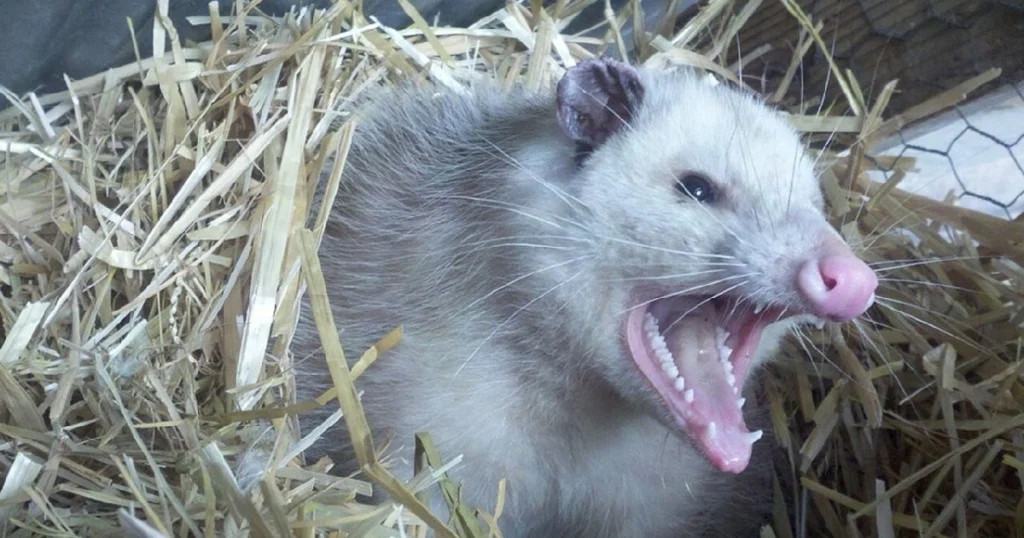 opossum at night
opossum at night
What Sound Do Opossums Make? Opossums use a variety of vocalizations to communicate. Understanding these unique sounds helps us better understand their behavior.
1.1. The Opossum’s Sonic Toolkit: A Range of Sounds
Opossums aren’t exactly known for their melodious voices, but they have a surprising range of sounds they can produce. It is important to note that the specific sounds may vary slightly depending on the species of opossum. But generally, you might hear hisses, growls, screeches, clicks, and even a death-feigning response. The exact function of each sound can be nuanced. But they generally cover the basic needs of communication, defense, and mating. Each sound is a piece of the puzzle when trying to understand these often misunderstood animals.
1.2. Why Do Opossums Make These Sounds? Understanding the Purpose
Opossums aren’t just making noise for the fun of it. These sounds serve specific purposes. Here’s a quick rundown:
- Warning Signals: A hiss or growl is often a clear message: “Back off.”
- Defense Mechanisms: The screech is a desperate attempt to scare off predators, especially when feeling threatened.
- Communication: Clicks and chatters might be used between a mother and her young or during mating rituals.
By understanding the reasons behind these opossum noises, we gain insight into their behavior and social interactions.
2. Unveiling the Night Sounds: Opossum Vocalizations After Dark
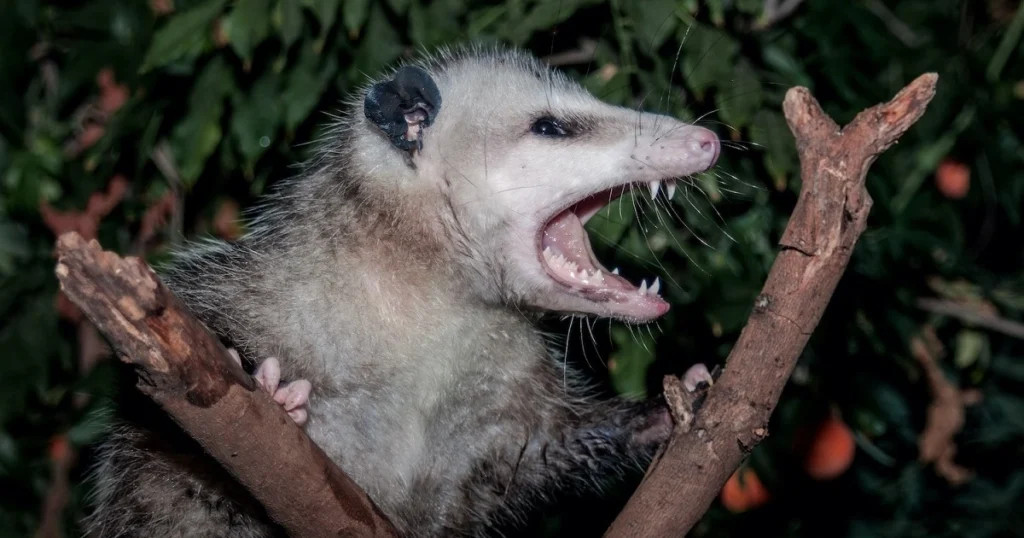 opossum
opossum
What sound does an opossum make at night? Opossums, being nocturnal, are most vocal during the night. Their noises often signal distress, warnings, or mating calls.
2.1. Identifying Opossum Noises in the Urban Nightscape
The urban night is full of sounds, from the hum of traffic to the distant wail of a siren. How can you tell if you’re hearing an opossum? It’s all about recognizing the specific sounds. Keep an ear out for:
- Hissing: A drawn-out, raspy sound, often accompanied by bared teeth.
- Growling: A low, guttural rumble, indicating displeasure or aggression.
- Screeching: A high-pitched, piercing sound, usually a sign of distress.
- Clicking: A series of rapid, soft clicks, potentially used for communication.
Familiarizing yourself with these opossum sounds can help you differentiate them from other nighttime noises.
2.2. What Does That Opossum Sound Mean? Interpreting Nighttime Behavior
Once you’ve identified an opossum sound, try to interpret what it might mean. For example, hissing and growling might indicate that an opossum feels threatened, perhaps by a pet or another animal. Screeching could mean it’s been injured or cornered. Clicking might be a sign that a mother is communicating with her young or is exploring a new area.
Remember, context is key. Consider the location, the time of night, and any other animals that might be present. These clues can help you better understand the opossum’s behavior and the meaning behind its sounds.
3. The Opossum Sound Dictionary: Decoding Common Noises
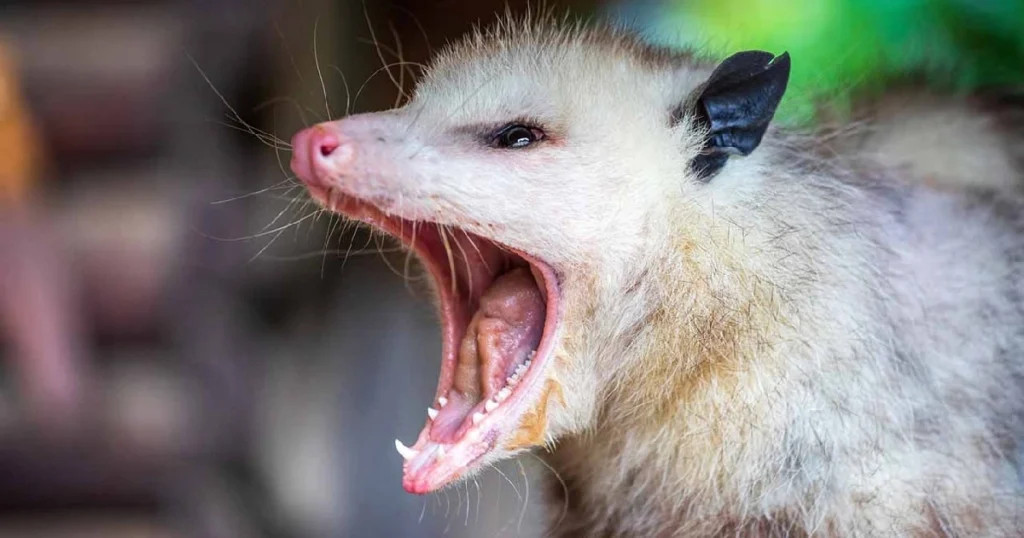 opossum hissing
opossum hissing
What sound does an opossum make most commonly? Opossums commonly make hissing and clicking sounds. Hissing is often a warning, while clicking can be a form of communication.
3.1. Hisses, Clicks, and More: Common Opossum Sounds Explained
Let’s dive deeper into the opossum sound dictionary, exploring some of the most common vocalizations:
| Sound | Description | Possible Meaning |
|---|---|---|
| Hiss | A drawn-out, raspy sound, similar to a snake. | Warning, threat display, defensiveness. |
| Growl | A low, guttural rumble, often accompanied by bared teeth. | Displeasure, aggression, territoriality. |
| Screech | A high-pitched, piercing sound, often startling. | Distress, fear, pain, being attacked. |
| Click | A series of rapid, soft clicks, sometimes described as a “snapping” sound. | Communication (especially between mother and young), exploration, possibly attracting a mate. |
| Chatter | A rapid series of clicks and squeaks | Excitement or nervousness |
| Playing Dead (thanatosis) | Silence, possibly with shallow breathing, body limp. | Defense mechanism, feigning death to avoid predation. |
This table provides a quick reference guide to help you identify and interpret common opossum sounds.
3.2. What Does an Opossum Sound Like When…? Situational Sounds
The meaning of an opossum sound often depends on the situation. Here are a few examples:
- When confronted by a predator: You’re most likely to hear hissing, growling, and potentially screeching. The opossum is trying to appear threatening and scare away the attacker.
- When interacting with other opossums: Clicking and chattering might be used for communication, especially between a mother and her young.
- When exploring a new environment: An opossum might make soft clicking sounds as it investigates its surroundings.
- When injured: A loud screech is a likely response to pain or distress.
- When cornered: Hissing and growling, often accompanied by a defensive posture, are common signs of fear and a last-ditch effort to avoid confrontation.
By considering the context, you can gain a more accurate understanding of what an opossum is trying to communicate.
4. The Opossum Sound Through the Ages: Vocalizations by Life Stage
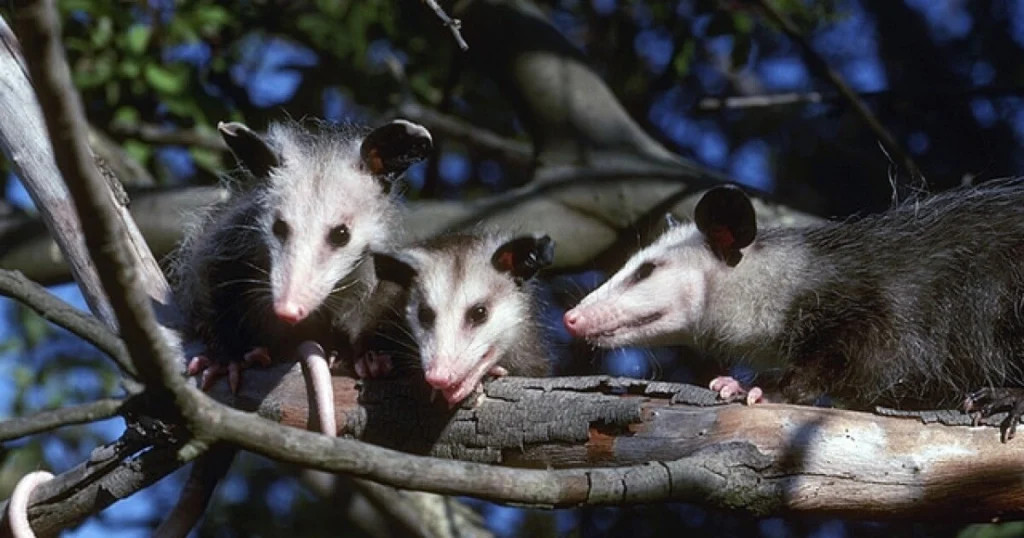 opossum sounds
opossum sounds
What sound does a baby opossum make? Juvenile opossums have different vocalizations than adults. They often make high-pitched sounds to communicate with their mothers.
4.1. Juvenile Sounds: The Vocalizations of Young Opossums (Joeys)
Baby opossums, or joeys, have a limited but distinct vocal repertoire. They rely on their mother for care and protection, and their sounds reflect this dependence. Common sounds include:
- Peeping: A high-pitched, bird-like sound used to attract the mother’s attention, especially when cold or hungry.
- Clicking: Soft clicks used for communication with the mother, often during nursing.
- Hissing (soft): A quieter, less aggressive hiss used when feeling threatened or disturbed.
These sounds are essential for the joey’s survival, allowing it to communicate its needs to its mother.
4.2. Adult Vocalizations: A More Complex Soundscape
As opossums mature, their vocalizations become more complex and varied. They develop a wider range of sounds to communicate in different situations, including:
- Hissing: A loud, forceful hiss used as a warning to predators or other opossums.
- Growling: A low, guttural rumble used to express aggression or displeasure.
- Screeching: A high-pitched, piercing sound used when in distress or pain.
- Clicking: A series of rapid clicks used for communication, exploration, and possibly attracting mates.
- Chattering: Fast-paced series of clicks and squeaks to demonstrate excitement and uneasiness.
Adult opossums use these sounds to navigate their social environment, defend themselves, and find mates.
5. Interpreting Opossum Sound: Linking Vocalizations to Behavior
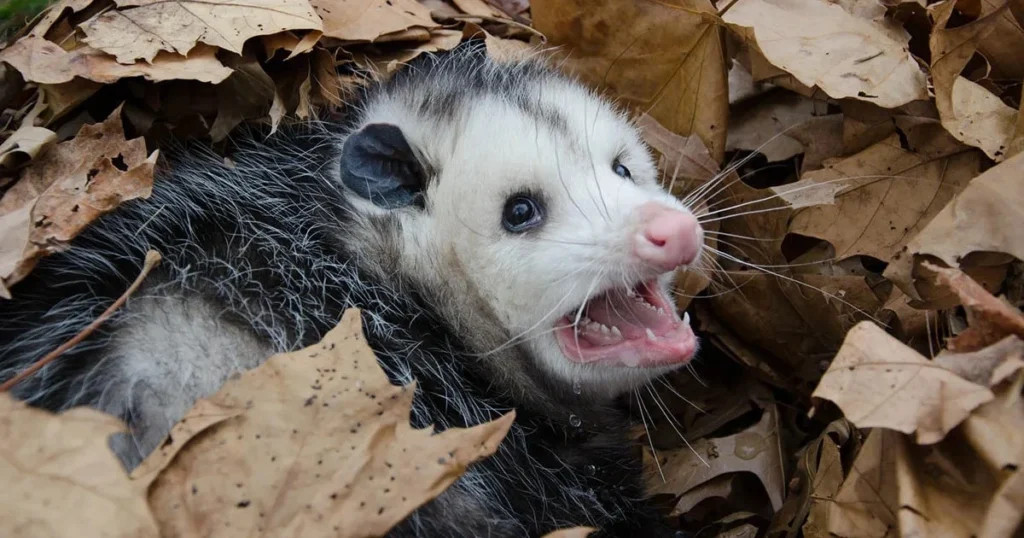 opossum defensive
opossum defensive
What does an opossum sound mean? Opossum vocalizations depend on their behavior. Aggressive or fearful opossums will hiss and growl, while mating opossums make different sounds.
5.1. Aggression, Fear, and Distress: Decoding Defensive Sounds
When an opossum feels threatened, its vocalizations often reflect its fear and anxiety. Common defensive sounds include:
- Hissing: A clear warning signal, indicating that the opossum feels threatened and is prepared to defend itself.
- Growling: A more aggressive sound, suggesting that the opossum is becoming agitated and may attack if provoked.
- Screeching: A sign of extreme distress, often indicating that the opossum is injured or in danger.
- Teeth Clicking: Rapid clicking of teeth to mimic rattlesnakes.
These sounds are all designed to deter potential predators and give the opossum a chance to escape.
5.2. Mating and Social Interaction: The Sounds of Opossum Relationships
Opossums aren’t always solitary creatures. They do interact with each other, especially during mating season. Here are some sounds associated with social interaction:
- Clicking: Soft clicks may be used for communication between potential mates or between a mother and her young.
- Chattering: Series of rapid clicks and squeaks to show excitement or anxiety around others.
- Grunting: Low grunting to indicate dominance and strength.
Understanding these sounds can provide insight into the social dynamics of opossums.
6. What To Do When You Hear It: Responding to Opossum Noises
 opossum hissing
opossum hissing
When should you worry about an opossum sound? Loud or persistent sounds could indicate the opossum feels threatened or has invaded your home, requiring professional help.
6.1. When to Be Concerned: Identifying Potential Problems
While opossums are generally harmless, there are times when their presence might be a cause for concern. Here are a few scenarios:
- Sounds coming from your attic or walls: This could indicate that an opossum has taken up residence in your home, potentially causing damage.
- Aggressive behavior: If an opossum is hissing, growling, or acting aggressively towards you or your pets, it’s best to keep your distance and contact animal control.
- Signs of illness: If an opossum appears sick or injured, avoid contact and contact a wildlife rehabilitator.
In these situations, it’s important to take appropriate action to protect yourself and your property.
6.2. Coexisting Peacefully: Respecting Opossums and Their Space
In most cases, opossums are simply trying to survive in a human-dominated environment. Here are a few tips for coexisting peacefully:
- Secure your trash cans: Opossums are attracted to food scraps, so make sure your trash cans are tightly sealed.
- Don’t leave pet food outside: Pet food can also attract opossums, so bring it inside at night.
- Trim overgrown vegetation: Opossums like to hide in bushes and shrubs, so keep your yard well-maintained.
- Leave them alone: If you see an opossum, simply observe it from a distance and allow it to go on its way.
By following these simple guidelines, you can help ensure that opossums and humans can coexist peacefully in our shared environment.
7. Need Opossum Removal Assistance? Contact Critter Stop!
If you’re dealing with an opossum problem on your property, don’t hesitate to contact the experts at Critter Stop. With their experience in wildlife removal, Critter Stop can safely and humanely remove opossums from your home or business, ensuring the safety of both you and the animals.
Contact Critter Stop today at (214) 234-2616 to schedule a free inspection and get rid of those unwanted opossums for good! Visit their website at https://critterstop.com/ for more information.
8. Frequently Asked Questions: Your Opossum Sound Queries Answered
8.1. What Does an Opossum Sound Like?
Opossums produce a variety of sounds, including hisses, growls, screeches, clicks, and chatters. The specific sound depends on the situation and the opossum’s age and emotional state.
8.2. How Can I Tell if an Opossum is Angry?
An angry opossum is likely to hiss, growl, and possibly bare its teeth. It may also adopt a defensive posture, such as arching its back and raising its fur.
8.3. What Do Baby Opossums Sound Like?
Baby opossums, or joeys, make high-pitched peeping sounds to attract their mother’s attention. They may also make soft clicking noises when nursing.
8.4. Are Opossum Sounds in the Attic a Cause for Concern?
Yes, opossum sounds in the attic could indicate that an opossum has taken up residence in your home. This can lead to property damage and potential health risks.
8.5. Can Opossums Sound Like Cats?
While opossums don’t typically meow like cats, some of their vocalizations, such as hisses and screeches, might sound similar to a cat in distress.
8.6. What is the Significance of the Clicking Sound Made by Opossums?
The clicking sound is believed to be used for communication, particularly between a mother and her young. It may also be used for exploration or to attract mates.
8.7. Do Opossums Make Different Sounds Depending on the Species?
While all opossums make similar types of sounds, there may be subtle differences in vocalizations between different species.
8.8. Is It Possible to Record Opossum Sounds for Research?
Yes, researchers often record opossum sounds to study their communication patterns and behavior. This can provide valuable insights into the lives of these fascinating creatures.
8.9. How Can I Deter Opossums from Making Noise on My Property?
To deter opossums, secure your trash cans, bring pet food inside at night, and trim overgrown vegetation. You can also try using motion-activated lights or sprinklers to scare them away.
8.10. Are Opossum Sounds a Sign of a Healthy Ecosystem?
The presence of opossums can indicate a healthy ecosystem, as they play a role in controlling pest populations and scavenging carrion. However, excessive noise or activity could also indicate an overpopulation of opossums in a particular area.
Explore the urban soundscapes with streetsounds.net. Discover the unique symphony of the city and connect with a community of sound enthusiasts.
Call To Action
Ready to explore the fascinating world of urban sounds? Visit streetsounds.net today to discover a rich library of sound effects, insightful articles, and a vibrant community of sound enthusiasts. Whether you’re a musician, filmmaker, or simply curious about the sounds around you, streetsounds.net offers something for everyone. Join us and let your ears be your guide. Address: 726 Broadway, New York, NY 10003, United States. Phone: +1 (212) 998-8550.
